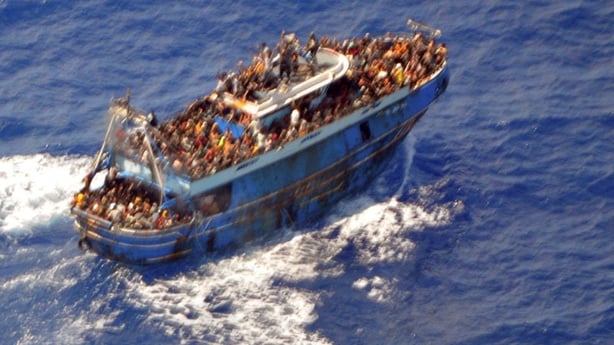A Syrian man has found his brother among shipwreck survivors in Greece in a tearful reunion.
Fadi, who came from the Netherlands, embraced his 18-year-old brother Mohammad through the gates at the port of Kalamata, where survivors of the deadly shipwreck were being held and cared for in a warehouse.
Fadi, visibly moved, said his brother had been in Libya for almost two years.
Greek rescuers are scanning the Ionian Sea by air and boat for survivors of a migrant boat sinking, as hope fades of finding more people alive two days after the disaster.
On Wednesday, a fishing boat overloaded with migrants capsized and sank, killing at least 78 people, off the Peloponnese. Some 104 people had been found alive.
The exact number of people aboard the boat is unknown, with one survivor telling hospital doctors in Kalamata he had seen 100 children in the boat's hold, broadcaster ERT reported.
"Hopes of finding survivors are fading each minute after this tragic sinking, but the search must continue," said Stella Nanou, a spokeswoman for the UN refugee agency UNHCR.
"According to broadcast images and accounts of some of the survivors, hundreds of people were aboard," she said.

The Greek coast guard said that rescuers scoured the sea through the night.
A helicopter, a frigate and three boats were scanning the waters this morning, a coastguard spokeswoman said.
Speaking on RTÉ's Drivetime, Hellenic Red Cross volunteer Dimitris Chaliotis said the situation is "depressing".
He said survivors had been on the boat for five days and most were exhausted, suffering from dehydration and hunger. Almost half needed intensive care, Mr Chaliotis said.
Teams as the Red Cross are trying to connect people with family, but he said that it will never be known how many people were on board, as estimates came from people on board who were suffering from shock and confusion.
UN calls for in-depth investigation
It comes as the United Nations called for in-depth investigations into the sinking, and urgent action to prevent further tragedies.
The UN agencies for refugees and migrants called in a joint statement for "urgent and decisive action to prevent further deaths at sea following the latest tragedy in the Mediterranean, the worst in several years".
They insisted states had an obligation to come together to address the dangerous gaps in search and rescue operations in the Mediterranean, pointing out that "the duty to rescue people in distress at sea without delay is a fundamental rule of international maritime law".
In particular, they rejected efforts to criminalise those who try to help in such situations, reiterating that "search and rescue at sea is a legal and humanitarian imperative".
The agencies also insisted that search and rescue operations should always be conducted in a manner aimed to prevent loss of life at sea, and said they welcomed that an investigation had been ordered in Greece into the circumstances that eventually led to the boat capsizing.
The UN rights office meanwhile called for "thorough" investigations into the "horrific tragedy".
Spokesman Jeremy Laurence told reporters in Geneva there was a need to investigate "people smugglers and human traffickers and ensure they are brought to justice", and that more broadly "there are a lot of questions that need to be asked".
Federico Soda, head of the International Organization for Migration's emergency department, said the tragedy once again showed the approach to migrant crossings in the Mediterranean needed to change.
"It is clear, that the current approach to the Mediterranean is unworkable," he said in the statement.
"Year after year, it continues to be the most dangerous migration route in the world, with the highest fatality rate."
UNHCR deputy chief Gillian Triggs also stressed the European Union's obligation to "put safety and solidarity at the heart of its action in the Mediterranean".
Nine arrested on suspicion of smuggling
Yesterday police arrested nine Egyptians on suspicion of people smuggling - one of them the captain of the boat carrying the migrants.
They were detained at the port of Kalamata, where the survivors are being cared for, said Greek news agency ANA.
The survivors, mainly from Syria, Egypt and Pakistan, were being housed in a Kalamata warehouse.
Greece, Italy and Spain are among the main landing points for tens of thousands of people who seek to reach Europe as they flee conflict and poverty in the Middle East, Asia and Africa.
